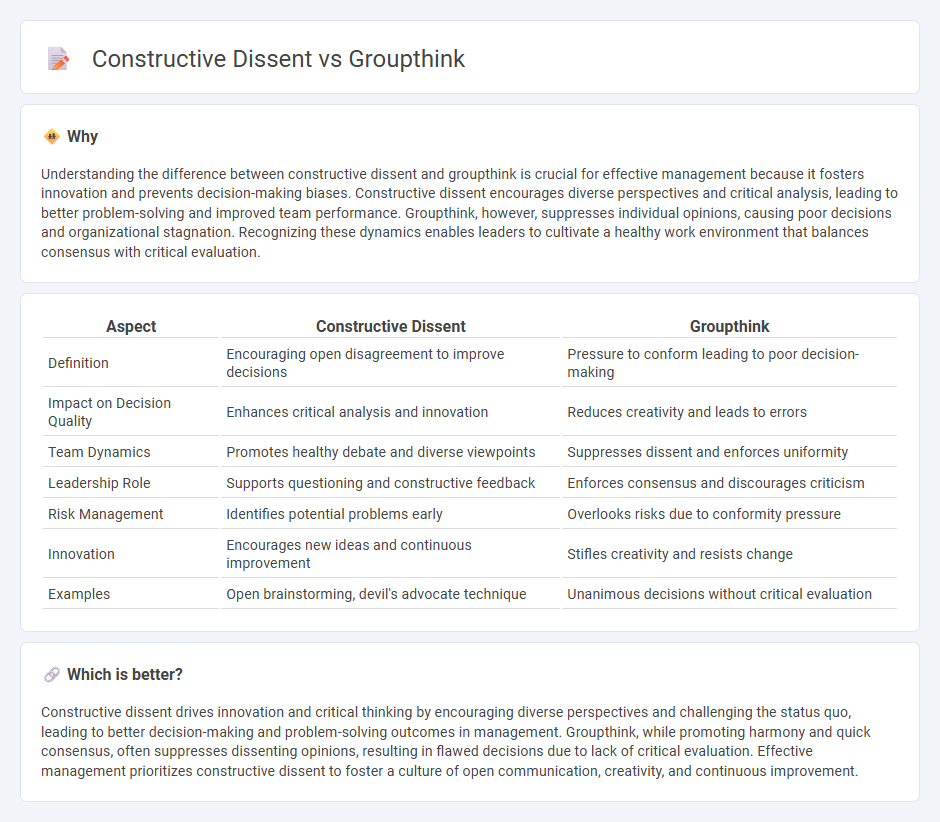
Constructive dissent fosters diverse perspectives and critical thinking within management teams, driving innovation and preventing decision-making blind spots. Groupthink, by contrast, suppresses individual opinions to maintain harmony, often resulting in poor outcomes and overlooked risks. Explore how balancing these dynamics can enhance leadership effectiveness and organizational success.
Why it is important
Understanding the difference between constructive dissent and groupthink is crucial for effective management because it fosters innovation and prevents decision-making biases. Constructive dissent encourages diverse perspectives and critical analysis, leading to better problem-solving and improved team performance. Groupthink, however, suppresses individual opinions, causing poor decisions and organizational stagnation. Recognizing these dynamics enables leaders to cultivate a healthy work environment that balances consensus with critical evaluation.
Comparison Table
| Aspect | Constructive Dissent | Groupthink |
|---|---|---|
| Definition | Encouraging open disagreement to improve decisions | Pressure to conform leading to poor decision-making |
| Impact on Decision Quality | Enhances critical analysis and innovation | Reduces creativity and leads to errors |
| Team Dynamics | Promotes healthy debate and diverse viewpoints | Suppresses dissent and enforces uniformity |
| Leadership Role | Supports questioning and constructive feedback | Enforces consensus and discourages criticism |
| Risk Management | Identifies potential problems early | Overlooks risks due to conformity pressure |
| Innovation | Encourages new ideas and continuous improvement | Stifles creativity and resists change |
| Examples | Open brainstorming, devil's advocate technique | Unanimous decisions without critical evaluation |
Which is better?
Constructive dissent drives innovation and critical thinking by encouraging diverse perspectives and challenging the status quo, leading to better decision-making and problem-solving outcomes in management. Groupthink, while promoting harmony and quick consensus, often suppresses dissenting opinions, resulting in flawed decisions due to lack of critical evaluation. Effective management prioritizes constructive dissent to foster a culture of open communication, creativity, and continuous improvement.
Connection
Constructive dissent challenges groupthink by encouraging critical evaluation and diverse perspectives within management teams, preventing conformity and poor decision-making. Effective leaders foster an environment where constructive dissent is valued, reducing the risk of groupthink-related errors. Organizations embracing this balance enhance innovation, accountability, and overall performance.
Key Terms
Conformity
Groupthink occurs when conformity pressures suppress dissenting opinions, leading to poor decision-making as group members avoid conflict to maintain harmony. Constructive dissent encourages diverse viewpoints and critical evaluation, reducing conformity and fostering innovative solutions. Explore strategies to balance conformity and dissent for effective collaboration.
Critical Evaluation
Groupthink suppresses critical evaluation by promoting conformity and minimizing dissenting opinions, leading to flawed decision-making processes. Constructive dissent encourages diverse perspectives and challenges assumptions, enhancing critical evaluation and fostering better problem-solving outcomes. Explore how organizations can balance these dynamics to improve decision quality and innovation.
Decision Quality
Groupthink often leads to poor decision quality due to the suppression of dissenting opinions and the prioritization of consensus over critical evaluation. Constructive dissent enhances decision quality by encouraging diverse perspectives and rigorous debate that challenge assumptions and surface potential flaws. Discover how fostering constructive dissent can revolutionize your organization's decision-making processes.
Source and External Links
Groupthink | EBSCO Research Starters - Groupthink is a sociological theory explaining how cohesive groups make irrational decisions due to a desire for unanimity that overrides realistic appraisal of alternatives.
Groupthink - Groupthink is a psychological phenomenon where the desire for harmony in a group leads to irrational or dysfunctional decision-making outcomes.
Groupthink: Definition, Signs, Examples, and How to Avoid It - Groupthink refers to the tendency for cohesive groups to reach decisions that are extreme and unwise because they prioritize consensus over alternative perspectives.
 dowidth.com
dowidth.com